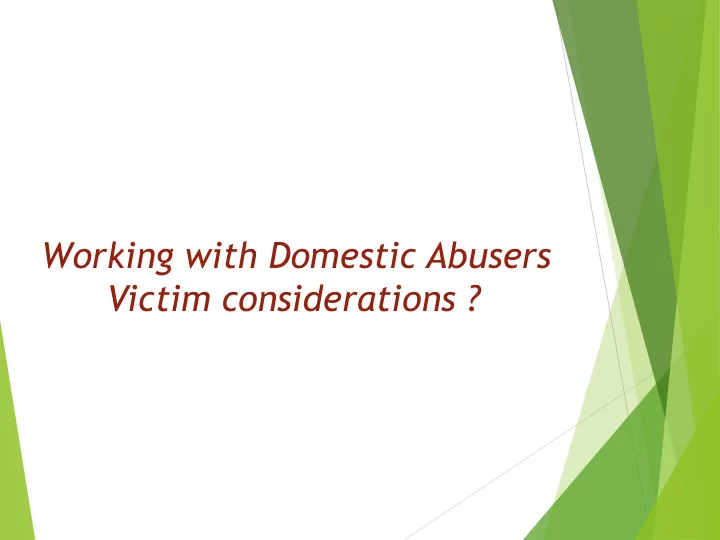

Working with Domestic Abusers Victim considerations ?
Criminal Justice System and Victims Guiding principals : Protection , needs and rights of victims of domestic violence is paramount Directive 2012/29/EU on Victims Rights (Victims Directive) Article 3 - Right to understand / right to be understood Article 6 - Right of victims to receive information about their case Article 7 - Right to interpretation and translation Article 8 – Right to access to victim support services Article 10 -Right to Right to be heard Article 19 – Right to avoid contact between victim and perpetrator Article 22 – Individual assessment of victims to identify specific protection needs
Ireland’s response to EU Directive : Criminal Justice ( Victims Of Crime Act) 2017 Probation Service established a dedicated Restorative Justice and Victim Services Team (2018) comprised of 1 central co-ordinator 5 Senior Probation Officers 14 Probation Officers ( regionally based) Objective : single point of contact for victims
Restorative Justice & Victim Services Team provides - Responses to general victim queries about the Criminal Justice System Information on Probation ( No Domestic Service Violence Interventions victim requests with to date for offenders, VOM) including DV Support for victims who wish to engage in a Restorative Justice process eg. Victim Offender Mediation(VOM)
SARA Risk Assessment Probation Reports to Court are underpinned by the SARA Victims are invited to contribute to the assessment process - primary source of victim collateral information Victim consent for participation is sought through Police Victim participation is voluntary Victim safety is primary consideration Victims interviewed separately to perpetrators in a venue of their choosing ( EU article 19)
Probation Officer Role with Victims : Understand the nature and extent of domestic violence suffered by victim Collateral information for SARA (do not rely on perpetrator self report ) Ascertain the victims perception of risk of future victimisation Safety Planning concerns highlighted by victims/factors which escalate risk noted eg. substance misuse Risk management plan post assessment will include victim safety considerations
Limitations of PS Victim Involvement : Probation officers do not adopt an ongoing caseworker role with victims Victims are directed to specialist victim support services eg. Women’s Aid ( article 8) Victims are encouraged to maintain close contact with the police if they have ongoing safety concerns Police to provide information on the progress of Court case ( article 6)
Perpetrator treatment and victim contact : DV programme providers ( MOVE/MEND and Probation) link victims in with specialist victim support services if they consent Service level agreements with victims services includes the provision of risk information to DV treatment programme providers where victim discloses new concerns Selective Information provided to victims via specialist victim’s services re. aspects of programme work which may impinge on her eg. Time Out techniques
Challenges re. Victim Involvement ? SARA Assessment – how to securely store victim information – GDPR Maintaining victim safety a real staff concern Information provided by victims should be directly quoted in reports to Court unless victim wishes (provides an understanding of offender behaviour and future victimisation risks) Information disclosed by victims should not be shared with offender Child protection concerns must be reported to relevant authorities
Challenges continued : Victim Safety is best achieved through inter- agency working ( integrated approach ) hard to get all stakeholders to the table ! Victims can find to difficult to ‘let go’ of Probation Officer once rapport established Conflicting information may be provided by victim and offender where there is mutual IPV Thankyou Carmel Donnelly, Probation Service Ireland
Recommend
More recommend